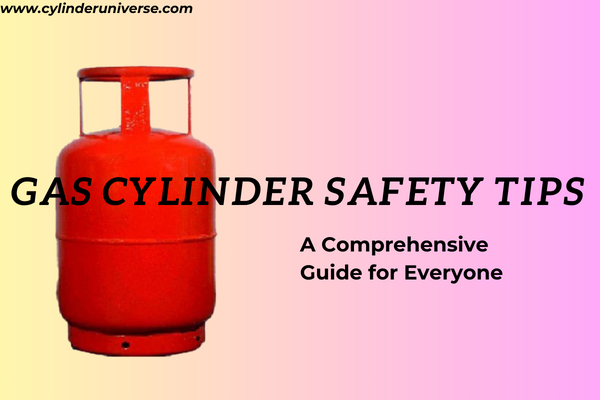Gas Cylinder Safety Tips: A Comprehensive Guide for Everyone
Gas cylinders are a common sight in our everyday lives. From cooking at home to industrial use, these pressurized containers are essential for various purposes. However, it’s crucial to handle them with care to prevent accidents and ensure the safety of everyone involved. In this article, we’ll explore essential gas cylinder safety tips that anyone, from homeowners to professionals, should be aware of.

Table of Contents
Introduction
In article we discussing about the gas cylinder safety tips. Gas cylinders play a vital role in our daily lives, offering a convenient and efficient way to store and transport gases. However, mishandling them can lead to serious accidents. This article provides valuable insights into gas cylinder safety, covering everything you need to know to handle them responsibly.
Understanding Gas Cylinders
Gas cylinders come in various sizes and are constructed to withstand high pressures. They typically contain gases like oxygen, propane, or acetylene. To ensure safety, it’s essential to understand the type of gas in the cylinder, as each gas comes with its unique properties and risks.
Selecting the Right Cylinder
When choosing a gas cylinder, consider factors like the gas type, cylinder material, and pressure requirements. Using the wrong cylinder for a particular gas can be hazardous. Always follow the manufacturer’s recommendations and guidelines for proper selection.
Storage and Handling
Proper storage and handling are key to gas cylinder safety. Securely store cylinders in a well-ventilated area, away from direct sunlight and heat sources. Ensure they are stored upright and are never subjected to physical damage.
Transportation Safety
Transporting gas cylinders requires extra caution. Always use a dedicated cylinder cart or trolley designed for this purpose. Ensure the cylinder is securely fastened during transport, preventing any accidental falls or collisions.
Connection and Use
Connecting a gas cylinder to equipment should be done following the manufacturer’s instructions. Make sure all connections are leak-free and that there are no damaged parts. Use the appropriate regulators and pressure settings for each gas.
Detecting Gas Leaks
Gas leaks can be extremely dangerous. To detect a leak, use a soapy water solution to check for bubbles around connections. If you suspect a leak, turn off the gas source, ventilate the area, and contact a professional immediately.
Emergency Procedures
In case of an emergency, knowing what to do can make all the difference. Evacuate the area if a gas leak is detected and call for help. Familiarize yourself with emergency shut-off procedures, fire extinguisher locations, and other safety measures.
Maintenance and Inspection
Regular maintenance and inspection are essential to ensure the integrity of gas cylinders. Look out for signs of corrosion, dents, or damage, and schedule professional inspections as recommended by the manufacturer.
Disposal of Gas Cylinders
Proper disposal of gas cylinders is crucial. Never attempt to dispose of them in regular waste. Contact your gas supplier or a specialized disposal service for guidance on safe and eco-friendly disposal.
Conclusion
In conclusion, gas cylinder safety is of utmost importance to prevent accidents and protect lives. By understanding the type of gas, selecting the right cylinder, and following safety guidelines for storage, transportation, and usage, you can ensure a secure environment for yourself and those around you.
FAQs about Gas Cylinder Safety
Q1: What are the main hazards associated with gas cylinders?
Gas cylinders can pose various hazards, including gas leaks, explosions, and fires. Mishandling, incorrect storage, or using the wrong type of cylinder can lead to these risks.
Q2: How often should I inspect my gas cylinders?
Regular inspections are essential. Visual checks should be done each time you handle a cylinder, while professional inspections, depending on the gas type, should occur annually or as recommended by the manufacturer.
Q3: Can I use any gas cylinder for my home barbecue grill?
No, you should use a cylinder specifically designed for grilling, like a propane cylinder. Using the wrong type of cylinder can lead to accidents and pose serious risks.
Q4: What should I do if I suspect a gas leak in my home?
If you suspect a gas leak, immediately turn off the gas source, ventilate the area, and evacuate. Do not use any electrical devices or open flames, and call for professional assistance.
Q5: How should I dispose of an empty gas cylinder?
Empty gas cylinders should be returned to the gas supplier or a designated disposal service. Do not attempt to dispose of them with regular waste, as they may still contain residual gases that can be hazardous.
Gas cylinder safety is everyone’s responsibility. By following these guidelines and being aware of potential risks, you can protect yourself, your loved ones, and the environment. Stay safe and informed when dealing with gas cylinders, and remember that prevention is the best safety measure.
2 thoughts on “Gas Cylinder Safety Tips: A Comprehensive Guide for Everyone”